|
Within the week of Ljubljana University, I was very happy to receive the Best Young Professor Award for Extraordinary Teaching and Research Achievements, which was handed to me at the very nice event on December 1st at the main University building.
0 Comments
This year's special theme is HRM in start-ups, and the ABC accelerator was kind enough to allow us to work with their current batch (plus two more, MIPA HR agency and Creatrix). Gallery from the first meeting with students here.
As of today, I became a registered organizational designer, a member of the Orgdesignhub (Centar za organizacijski dizajn COD), based in Croatia and ran by our friend and colleague from Faculty of Economics and Business University of Zagreb:
Centar za organizacijski dizajn (COD) je virtualna zajednica studenata, znanstvenika i stručnjaka koji se žele informirati, učiti i razvijati u području organizacije i menadžmenta, s posebnim naglaskom na razvoj organizacije i ljudskih potencijala. Jezgru COD tima čini nekolicina znanstvenika koja se aktivno bavi teorijom i praksom dizajniranja i organiziranja poslovnih sustava, s ciljem njihova daljnjeg razvoja i povećanja individualne, grupne i organizacijske djelotvornosti. Some more good news, our three-study paper 'I want to be creative, but … preference for creativity, perceived clear outcome goals, work enjoyment, and creative performance' was (after three rounds of review, lasting for about a year and a half) accepted for publication in European Journal of Work and Organizational Psychology. Here's the abstract:
In today’s quickly changing work environment, many individuals want to be creative at their workplace, but only some of them succeed at manifesting these tendencies. In three studies, using both field and experimental data, we focused on transforming individuals’ preference for creativity, defined as an inclination for liking and wanting to be creative, into actual creativity. We first conducted a pilot Study 1 to establish discriminant validity to related constructs and provided initial evidence on predictive and incremental validity of the preference-for-creativity scale. Next, we performed a field Study 2, where we found that transforming preferences for creativity into supervisor-rated creativity is contingent upon employees’ perceptions of clear outcome goals. Clear outcome goals fostered individuals’ preference for creativity to result in higher levels of supervisor-rated creative behaviour—a finding that was replicated in an experimental Study 3. Furthermore, we explored whether work enjoyment mediated the moderated relationship between preference for creativity and creative outcomes. The results supported our mediated moderation model, whereby the manipulation of clear goals led to higher work enjoyment, influencing individuals’ preference for creativity to result in higher ratings of their creative outcomes. The Norwegian Research Council recognized our past work and potential in our ideas, and approved our project entitled Fair Labor in the Digitized Economy, set up by our colleagues at BI Norwegian Business School Sut I Wong Humborstad and Christian Fieseler.
The primary objective of this project is to investigate what constitutes fair labor in an employment environment disrupted through new technology. To this end, we want - to depict the substitution effects of technology and new digital business models on traditional forms of labor, and anticipate new forms of employment to deliver insights on the nature, desirability, advantages and disadvantages and the fairness of these emerging forms of work, taking into account both the employment and corporate perspective. - to deliberate on the effects more or less labor fairness has on human well-being and social cohesion. - to derive solutions in terms of responsible technology design, corporate responsibilities, political and public deliberation, and employee skill building and consultation. Specifically, the Slovene part of the project will focus on how creativity and innovation are shaped in light of the digital labor, and what potential job-design and organizational-design measures can be applied to overcome the barrier of not being present at work together, physically. The project consortium, besides the leading partner in Norway and Faculty of Economics University of Ljubljana, includes the following: institutions Harvard University, University of St. Gallen, Copenhagen Business School and Erasmus University (Rotterdam). This time in Sarajevo in the first week of June. After a tremendously teaching-intensive semester with my wonderful HRM students, things were and still are starting to be a bit less hectic. We got a chance to enjoy the hospitality of the local SEBS (Sarajevo School of Economics and Business) team and spend some time in the city (not only at our meetings and conferences). I was also teaching at their master's Public Administration program, albeit only for a day. Next up - HRM exams, a month of research and mentorship activities, and then we're off to the States/Canada for the AoM meeting in Vancouver.
Organized by COBIK (and financed through IPA project PACINNO and another initiative VIBE), CoInvest venture days 2014 are on their way. They kick-off today in Nova Gorica with PACINNO Tech Investment Conference, followed by tomorrow's action within Balkan Venture Forum, which will include quite some prominent speakers and guests from the entrepreneurial world in Slovenia and the Adriatic region.
V nedeljo sem imel priložnost in čast sodelovati v komisiji, ki je ocenjevala pitche dijakov v okviru start-up vikenda na moji bivši Gimnaziji Novo mesto. Navdušen nad tem, kaj in kako kvalitetno lahko skupine mladih naredijo v enem vikendu ter na kakšen način razmišljajo. Spodbujanje podjetniških iniciativ že v srednjih šolah (in še prej) je super način priprave na reševanje odprtih problemov in izzivov tako na poslovnem kot drugih področjih. Nekatere predstavitve so bile res super in boljše kot jih dostikrat vidim na precej višjih nivojih pitchanja investitorjem. Upam da se bo kdo od teh dijakov vpisal na EF :) Več o dogodku, ki je potekal v organizaciji podjetniškega krožka Gimnazije NM tukaj.
22. 10. 2014 je v knjigarni Felix potekala predstavitev ene najboljših poslovnih knjig zadnjega desetletja po mnenju Financial Timesa, Wall Street Journala in Amazona. Knjigo DAŠ IN DOBIŠ (Give and Take) Adama M. Granta sva predstavila skupaj z urednico slovenske izdaje knjige Branka Fišer.
Predstavitev knjige (vabilo) in slika s tiskovne konference spodaj. V torek, 21. 10. 2014 sem bil del okrogle mize in sodeloval v prijetni diskusiji o prenosu in skrivanja znanja v okviru posveta Izobraževalni management 2014. Opis dogodka tukaj.
Thanks to our knowledge-hiding-researching friends from Canada, our research was noticed by The New York Times. Here's their article.
We just got the news that our paper 'I Get By With a Little Help From My Supervisor: Creative-Idea Generation, Idea Implementation, and Perceived Supervisor Support' (Miha Škerlavaj, Matej Černe, Anders Dysvik) was accepted to be published in Leadership Quarterly!
Here's the abstract: In two studies using both field (165 employees and their 24 direct supervisors from a manufacturing firm in Study 1) and experimental (123 second-year undergraduate student participants in lab Study 2) data, we explore how perceived supervisor support acts as a crucial contingency that enables higher levels of idea implementation from creative-idea generation. First, we suggest that excessive creative-idea generation (in terms of both frequency and creativity of ideas) can lead to diminished returns with regards to idea implementation. Drawing on a resource allocation framework, we hypothesize and find a curvilinear inverse U-shaped relationship between employee creative-idea generation and implementation. Second, we examine perceived supervisor support as a moderator of the curvilinear inverse U-shaped relationship between idea generation and implementation. In line with our second hypothesis, we find that higher levels of perceived supervisor support dampen the curvilinear relationship between creative-idea generation and idea implementation. Accordingly, perceived supervisor support seems to provide employees with access to resources and support needed for idea implementation, making highly creative ideas more implementable. On a personal note, LQ was the first academic journal I ever read (when I wrote my bachelor thesis on authentic leadership a couple of years ago), so this publication holds even more significance. In April, we visited Oslo again at the Organizational Learning, Knowledge and Capabilities conference. With the proposed theme “Circuits of knowledge” we hope the conference contributions may be inspired to further develop the organizational learning, knowledge and innovation literature through conceptual and empirical contributions. The metaphor is meant to open up explorations of how knowledge and organizational learning may be said to move or revolve around, in, and through circuits. Familiar concepts may be learning cycles and –loops, and the recursiveness of practice.
Besides the conference, we got a chance to get together and work with colleagues from BI Norwegian Business School. Our Academy of Management Journal paper was published in-print this month, and we've gotten some coverage in Business Daily, some hype in management-issues.com, and even an article in Yahoo!News
Earlier in February, we've kicked-off the IPA-financed PACINNO (Platform for trans-Academic Cooperation in Innovation) project that we successfully designed along with friends/colleagues from seven countries and applied for in CoBIK.
The goal of PACINNO is to establish a platform for cooperation in research and innovation covering the whole Adriatic region. Targeting both research institutions, policy makers and business entities, the project will help develop new bridges between the research and scientific activities, carried out at academic institutions, and the economic system, with specific reference to the technological needs of SMEs. More generally, PACINNO is aimed at overcoming the main obstacles and barriers to the economic development of the Adriatic countries, fostering the competitiveness of their minor firms (both in the high-tech fields and in the traditional industries), and promoting the creation of innovative start-ups. Here's the project consortium: Final Beneficiaries
Po otvoritvi EF kotička na v knjigarni Konzorcij sem bil 'zraven' še pri eni premierni aktivnosti Ekonomske fakultete: prvem dogodku projekta še tesnejšega povezovanja fakultete z gospodarstvom - EF raziskave. Publiki, sestavljeni iz kadrovskih managerjev slovenskih podjetij smo predstavili izsledke naše raziskave o medsebojnem vplivu relacijskih klim in HR sistemov na proaktivno vedenje in medsebojno pomoč med zaposlenimi. Več v EF novički.
Related to the research award we got earlier this year, CEEMAN recently published an interview with Miha Škerlavaj and myself. You can find and download it here: https://mail.google.com/mail/u/0/?ui=2&shva=1#search/ceeman/1430a0cf9c7903d4.
And here's the FELU news, only in Slovene: http://efnet.si/2013/12/v-ceeman-news-70-objavljen-intervju-s-prof-dr-miho-skerlavajem-in-doc-dr-matejem-cernetom/ V knjigarni Konzorcij smo v torek, 26. novembra 2013 odprli EF kotiček- Ekonomija v centru.
Kotiček je otvorila dekanja Ekonomske fakultete, prof. dr. Metka Tekavčič. Otvoritvi je sledila predstavitev knjige Napredni management avtorja, prof. dr. Vlado Dimovskega s soavtorji (doc. dr. Sandra Penger, Judita Peterlin, doc. dr. Matej Černe, Miha Uhan in Miha Marič) ter okrogla miza na temo Ali so slovenska podjetja vodena učinkovito? Z avtorji knjige in gosti se je pogovarjala recenzentka knjige, prof. dr. Nada Zupan. Več v EF novički: http://efnet.si/2013/11/ekonomija-v-centru/ As I'm now employed at the Faculty of Economics Ljubljana University full-time, there's quite a teaching load I have at my hands. In this semester, this means conveying some practical workshops on Creativity and Innovation at Work within the Business skills development course for our +2 masters students, and organizing a whole course on Learning and Knowledge Management for our enthusiastic exchange students from all over the world. A lot of fun!
The second annual CoINVEST investment conference organized by COBIK took place in Nova Gorica last Thursday and Friday. A lot of interesting projects and matchmaking with potential investors.
|
Matej Černe, PhD
Researcher, lecturer and consultant on the field of management and organization. Archives
August 2023
Categories |
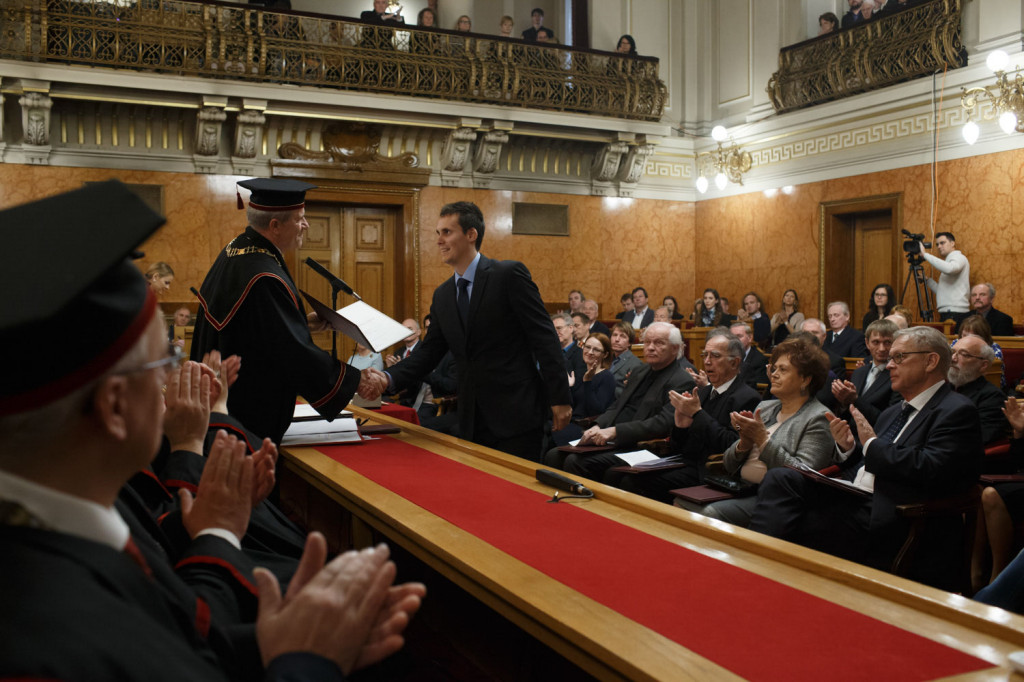
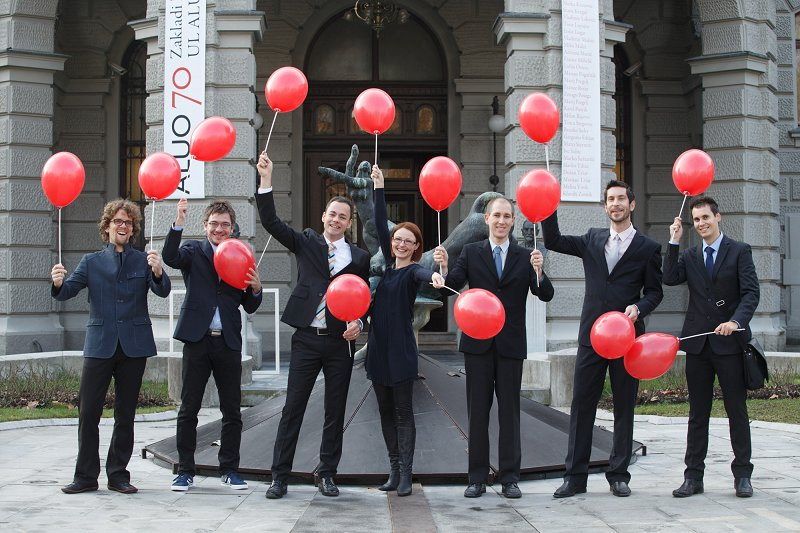
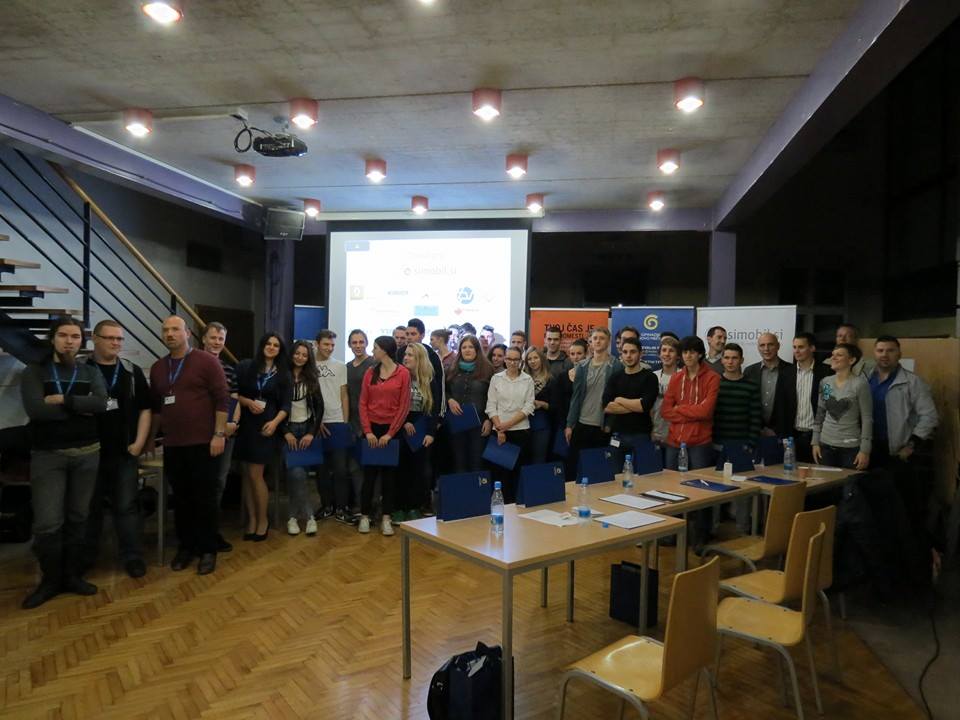
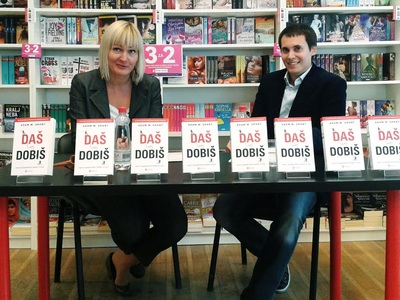
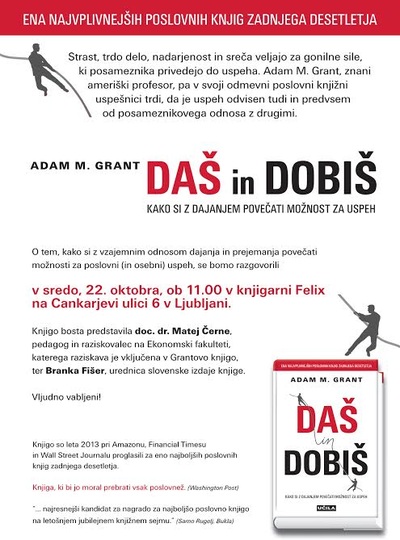

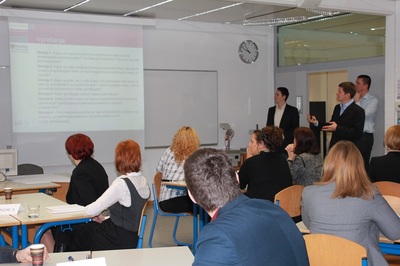
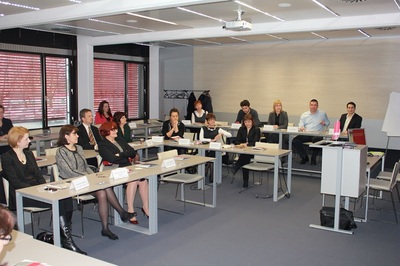
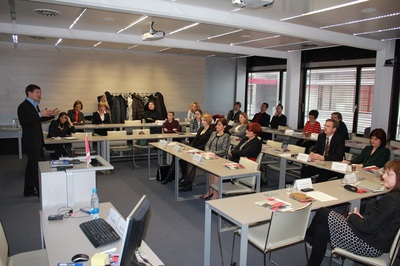
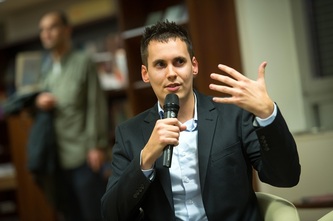
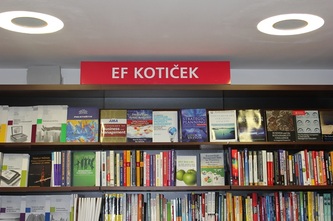
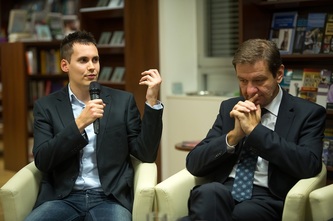
 RSS Feed
RSS Feed
